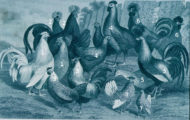A few weeks ago, I wrote
about how drought
had made my pasture plants stop growing, so I sent the chickens out to
forage in the woods.
Unfortunately, our young rooster hadn’t yet bonded to his new home
(having been moved there from the broiler coop on the opposite side of
the garden only a few weeks before). So he circled around our
perimeter and ended up in the garden, ladies in tow. Bad
chickens! Back into the pasture!
Since the woods no
longer seemed like an option as a summer escape valve, I was forced to
admit that I’d be overgrazing at least one paddock until rain showed
back up. Rather than degrading my entire pasture system, I
stopped rotating and let the flock scratch the annual
ryegrass paddock
bare — I needed to decide what to do with that space now that the
cool weather cover crop had mostly stopped growing anyway.
Luckily, rain came just
as the last scrap of greenery disappeared down our chickens’ gullets,
so I was able to rotate them to a newly regrown pasture. But what
to do with the bare ground in the overgrazed pasture?
I remembered how much
difference the patches of organic matter in other pastures made during
the recent drought, so I decided to pull this pasture out of rotation
and spend the rest of the summer rotating it through cover crops.
About fifteen pounds of buckwheat seeds with three bales of straw
loosely scattered over it got me started, and I plan to use the
method I came up with in the vegetable garden last year to plant back
to back buckwheat crops until the time comes to
plant oilseed
radish.
The chickens won’t be able to
graze the buckwheat, but they should be able to nibble on the radishes
during the winter, and come spring I’ll seed grass and clover into the
fertile ground. Of course, that means I’ll have to baby the
pasture most of next year while the perennial pasture plants become
established, which means the paddock will be out of commission for
about eighteen months, but sometimes you have to put up with short-term
inconveniences to build the long term health of a homestead.
garden weeds) kept the flock healthy while they were cooped up
in a small space.

